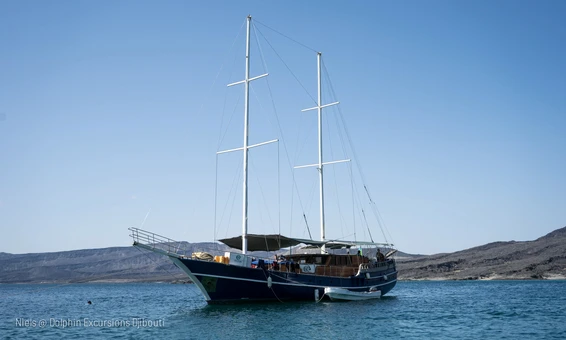Dive Destinations
Liveaboards
Resorts / Day Trips
Scuba Training

PRICE PER DAY FROM USD 0
LOWEST PRICE GUARANTEE
Located where the Red Sea joins with the Gulf of Aden, the East African nation of Djibouti is very much an off-the-beaten-track destination. The Gulf of Tadjoura and Ghoubet Bay are known to be among the best places in the world for diving and snorkelling with whale sharks, and you can do too, with the Deli liveaboard, operated by Djibouti's oldest dive operator. Relax and experience the natural wonder of Djibouti with the local legends.
Powered by a 280 HP MAN auxiliary engine, the Deli is an iconic 26m long Turkish-style gulet with plenty of character. It has a wooden hull with twin masts and mahogany and teak furnishings. With a maximum capacity of just 12 guests, it is the ideal economy vessel. There are 6 cabins onboard, each with its own private bathroom.
Meals are served in the open air towards the rear of the main deck. They are a mixture of rice or pasta dishes, with salad, fresh fish or sashimi, vegetable, and meat with sauce. Also at the stern of the yacht is a social area. Here you will find beds for lounging after a dive or sleeping under the stars. There is a small indoor saloon which is used when it rains.
Divers prepare for dives on the deck of the Deli mothership and 2 40 HP 7m motorised dinghies take them to all the dive and snorkel spots. The yacht is equipped with 12 litre aluminium tanks and a Bauer Mariner compressor. The saloon has charging points for underwater cameras. Unusually, the use of scuba equipment is included in the cruise price.
During these liveaboard safaris, guests have the option to make day or overnight excursions to see some of Djibouti's natural highlights. You can enjoy the incredible landscapes of the salt lake of Assal, Lake Abbe, and the Day Forest.
Dive experience: A standard Open Water Diver license or equivalent is all that is required to dive in Djibouti since the conditions are easy and usually there is no current. However, it is recommended to have an advanced qualification and a minimum of 20 logged dives (to permit diving to 30m).
Cruise price per person includes: Cabin accommodation, breakfast, lunch, dinner, snacks, drinking water, hot drinks, return transfers from local airport or hotels, dives (as detailed in the trips above), scuba equipment rental, 1 experienced English-speaking divemaster, tanks (12 litre only), belt and weights, all taxes.
Cruise price per person excludes (mandatory, unless customer provides own): Dive computer (USD 23 per week). Unless otherwise stated, all the listed items need to be paid on arrival (cash only).
Optional extras: Soft drinks, alcoholic drinks, torch (USD 23 per week), diving insurance. Unless otherwise stated, all the listed items need to be paid on arrival. Note: prices of items purchased onboard are subject to change.
How to get there: Djibouti liveaboard safaris with Deli normally use the harbour in Djibouti City. Once you arrive at Djibouti International Airport (code JIB), a boat representative will greet you outside the arrivals hall. Major airlines that fly to Djibouti include Emirates, Qatar Airways, Air Djibouti, Air France, Ethiopian Airlines, Turkish Airlines, Fly Dubai and Kenya Airways.
Transfers are provided form the airport and local hotels and take 20 minutes. Boarding takes place early morning since the boat leaves the harbour at 8 am.
The last dive of the trip will be at 2 pm on the final day before the boat returns to port by 5-5:30 pm and guests disembark. Please wait at least 18 hours before flying after diving.
Diving Environment: Djibouti is located close to the Horn of Africa, in the Gulf of Aden and at the entrance to the Red Sea. The best known region is the Seven Brothers archipelago and there are relatively untouched soft and hard coral reefs, amazing drop offs and ship wrecks. You will have the opportunity to see large schools of fish, dolphins and manta rays. But the region is best known for its abundant whale sharks. Although they can be seen throughout the year, whale shark encounters are especially common from the beginning of November to the end of January.
Over 200 species of coral are found in Djibouti, at the mouth of the Red Sea and Gulf of Aden, making it an extremely diverse ecosystem. Currents coming in from the Indian Ocean attract large marine animals such as the whale sharks, pilot whales, beaked whales, grey and nurse sharks, manta rays and dolphins. It’s also very common to see large schools of stingrays, barracudas and groupers.
All dives are done from the 2 motorised tenders. The visibility during whale shark season is about 15m (50 ft), but improves to 30m (100 ft) by April until early July. The water temperature from November to January is 26-28°C (80-82°F), and rises to 30°C (86°F) by April. A 3 or 5 mm wetsuit is recommended during whale shark season, 3 mm at other times. Khamsin winds blow from mid-July until early September, closing all dive operations.
Non-diver rate: 10% discount off published price.
Single supplement (if you do not want to share accommodation): This is optional - single travellers may choose to pay a supplement of 50% of the published price for their own cabin, or share a cabin.
Dive clubs and group discounts: None. See whole boat charter policy below.
Whole boat charter rate (per night): 5% discount from the total cruise price.

Customer rating: Good

Customer rating: Average
